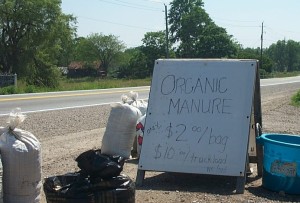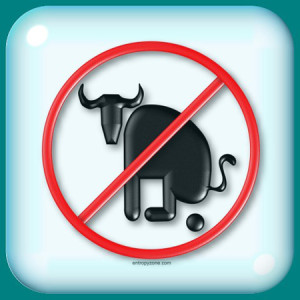I normally stay away from the organic nonsense because it’s about lifestyle, not safety.
 But John Block of The Des Moines Register writes that every day millions of shoppers are paying out as much as 50 or 100 percent more to buy organic foods for themselves and their families. I have friends who make these choices because they have no reason to question claims on labels, in advertising and on social media that organic foods are safer, healthier and more nutritious.
But John Block of The Des Moines Register writes that every day millions of shoppers are paying out as much as 50 or 100 percent more to buy organic foods for themselves and their families. I have friends who make these choices because they have no reason to question claims on labels, in advertising and on social media that organic foods are safer, healthier and more nutritious.
One thing they will not read on any label is a new finding from Academics Review, a group of scientists dedicated to testing popular claims against peer-reviewed science.
The scientists’ conclusion based on U.S. Food and Drug Administration (FDA) reported recall information: Organic foods are four to eight times more likely to be recalled than conventional foods for safety issues like bacterial contamination. Nor will consumers see anywhere a reference to the body of peer-reviewed research finding that organic foods are no more nutritious than foods produced by conventional agriculture.
As Academics Review founder Bruce Chassy, a professor of food microbiology at the University of Illinois, recently reported to a professional trade association, not only is the federal government failing to require that the organic food industry state these risks to consumers. It also allows organic companies to make unfounded safety claims that, if they were made by any other industry, would attract the ire of federal regulators.
 Lacking such scrutiny, the organic industry appears to have adopted “black marketing” against conventionally grown foods as its core strategy. The Natural Marketing Institute admitted as much when it reported that “the safety message is a clear driver” of organic sales. A marketing executive for a major organic company was little blunter: “You can, and perhaps should, lead with fear as an industry.”
Lacking such scrutiny, the organic industry appears to have adopted “black marketing” against conventionally grown foods as its core strategy. The Natural Marketing Institute admitted as much when it reported that “the safety message is a clear driver” of organic sales. A marketing executive for a major organic company was little blunter: “You can, and perhaps should, lead with fear as an industry.”
The industry does, in fact, lead with fear. The websites, social media, product packaging, marketing materials and annual reports of organic food companies are full of fear-based advertising against conventional farming. Even more hysterical claims about conventional foods are pushed in food scare campaigns run by NGOs funded by the organic foods industry, as well as by allied natural food and health companies.
In the midst of such claims, where do consumers turn for reliable information? They trust federal regulators to give them the straight scoop based on science. Yet even here, the federal government is passively complicit in allowing unscientific claims to mislead consumers. Exhibit A in federal complicity is the U.S. Department of Agriculture (USDA) certified Organic label.
USDA’s research shows that more than 70 percent of consumers are likely to believe a food is safer, more nutritious or of higher quality if it bears the organic label. In fact, all the label signifies is that a given food has been grown, handled and processed without many of the modern techniques of conventional agriculture.
The label does not even mean that a certain food was grown without pesticides. Organic foods are routinely produced with certain kinds of “organic” pesticides. Meanwhile, organic recalls due to bacterial contamination are ballooning along with the expanding market for organic food.
In short, the federal government is strict about science, labeling and claims for all industries except one. The marketers of organic food are allowed to make scientifically false and misleading claims about the safety and wholesomeness of conventional food, while their products are increasingly likely to be recalled for safety reasons.
Federal agencies have a statutory responsibility to crack down on untruthful and misleading claims in food marketing. They also have a responsibility to warn consumers about real dangers.
The findings by Academics Review raise a number of questions federal regulators should have to answer.
— Will the USDA, FDA and Federal Trade Commission enforce existing rules against misleading advertising when marketers misuse the organic label to vilify competitors?
— Will regulators regard the sponsored attacks on conventional agriculture as advertising, subject to standards of truth?
— Will the Centers for Disease Control and the Food and Drug Administration investigate what is behind the frighteningly high recall record of organic food?
— And will the government perform more research on the safety of organic foods?
This is no longer a matter of who wins at the checkout counter. For many vulnerable people, it is a matter of safety. They just don’t know it yet.
JOHN R. BLOCK was U.S. secretary of agriculture from 1981 to 1986. The lifelong farmer now is senior policy adviser to the law firm of Olsson Frank Weeda Terman Matz PC in Washington, D.C. Contact: jblock@ofwlaw.com.
